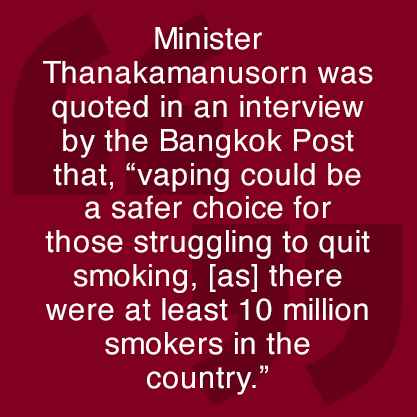The proposal of Thailand Minister of Digital Economy and Society Chaiwut Thanakamanusorn to lift the vaping ban in the country has gained massive support from different consumer groups in the Asia-Pacific region.
The Coalition of Asia Pacific Tobacco Harm Reduction Advocates (CAPHRA) and its member-associations said Minister Thanakamanusorn’s verbal support for the legalization of electronic cigarettes only confirmed what they have known for more than a decade—that innovative smokefree products such as e-cigarettes, heated tobacco products and snus are less harmful alternatives to combustible cigarettes that can help reduce the impact of the smoking epidemic.
Nancy Loucas, executive coordinator of CAPHRA, said that with no less than a Thai minister quoting science and scientific evidence in favor of vaping, Thailand should lift the ban on the innovative products and give the 10 million Thai smokers better alternatives to combustible cigarettes.
“This should be a massive wake-up call for Thailand’s government. He’s on the side of science and his calls have exposed the fact that Thailand has fallen well behind internationally when it comes to adopting effective tobacco harm reduction (THR) policies,” said Loucas.
Thailand has one of the world’s most restrictive policies against vaping, but Minister Thanakamanusorn was quoted as saying that vaping is safer for people trying to quit smoking and that he was looking at ways on how vaping could be legalized in the country.
Asa Saligupta, Director of ENDS Cigarette Smoke Thailand, expressed his support for the minister’s progressive position, saying his intentions to legalize e-cigarettes were not only good, but also evidence-based.
“We’ve since been blown away with the positive response, nationally and internationally, to his progressive position. He has done a lot to shine a light on Thailand’s failed tobacco control policies, which hopefully are now a little closer to one day changing for good,” said Saligupta.
Data showed that 72,656 people in Thailand died from illnesses caused by smoking in 2017, while the Public Health Ministry spent 77 billion baht annually to treat smoking-induced diseases and illnesses.

Minister Thanakamanusorn was quoted in an interview by the Bangkok Post that, “vaping could be a safer choice for those struggling to quit smoking, [as] there were at least 10 million smokers in the country.”
About 67 countries around the world have already legalized vaping to provide smokers an option to quit, but the massive lobbying by non-government organizations funded by billionaires such as Michael Bloomberg continue to put pressure on developing countries to prohibit the use of these new products.
The United Kingdom, which has the most progressive policy on nicotine, has long acknowledged the role of vaping in reducing the smoking rate in the country after no less than the Public Health England concluded that vaping products are at least 95-percent less harmful than combustible tobacco.
Other countries openly allowing vaping are other European nations, the United States, Canada and New Zealand. In the Philippines, the Senate and the House of Representatives are close to passing a law that recognizes tobacco harm reduction as a public health strategy to address the smoking problem. THR supports the use of less harmful alternatives to traditional cigarettes.
“International research shows countries which have adopted progressive policies around vaping have seen their smoking rates fall twice as fast as those countries, such as Thailand, which haven’t,” said Loucas.
She said vaping is the world’s most effective smoking cessation tool and smart countries like the Philippines are set to embrace it, not ban it.
CAPHRA said Minister Thanakamanusorn’s statement should remind other countries that continue to ban vaping such as India to reexamine their tobacco policy and determine if it contributed to the decline in smoking or exacerbated the problem.
The Indian government bans the use e-cigarettes and other electronic nicotine delivery systems, depriving hundreds of millions of smokers better alternatives to cigarettes. Experts said smoking rate in India has stagnated over the years, while other countries saw a dramatic drop in smoking prevalence.
“Australia, Hong Kong and India are in this club that’s acted on the corrupt advice of the World Health Organization (WHO) and its sponsor American billionaire Michael Bloomberg. Vaping bans inevitably fail, leading to totally unnecessary smoking-related illnesses and deaths,” said Loucas.

